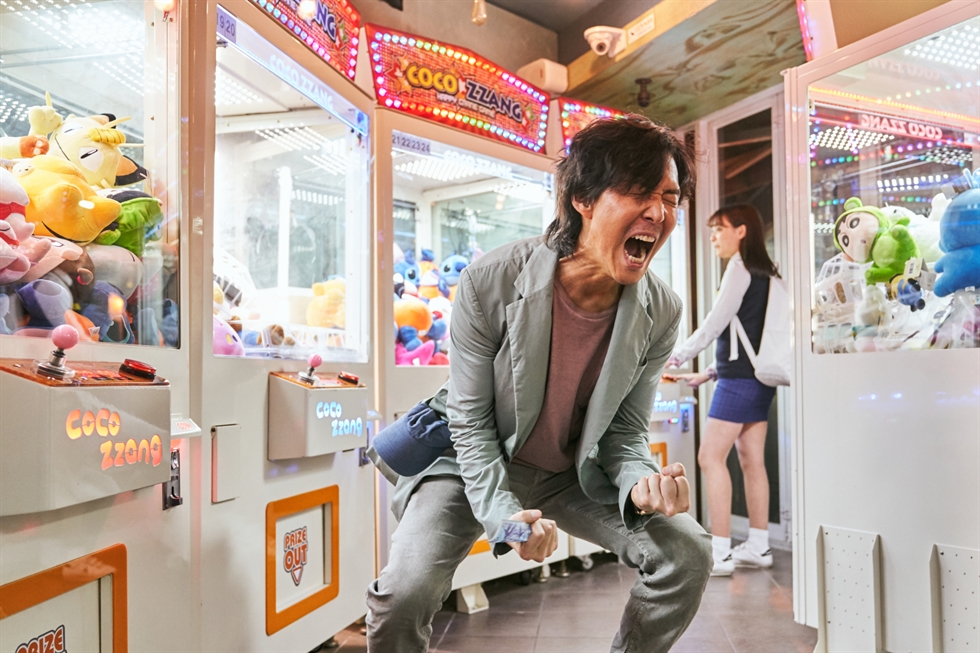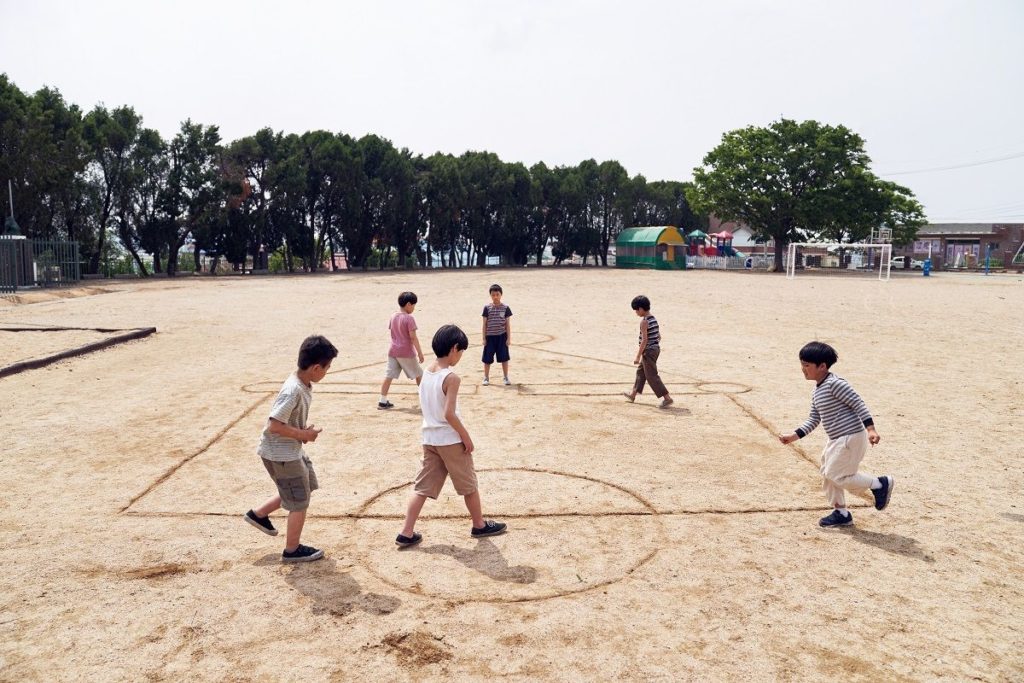Warning: This article contains spoilers for Netflix’s Squid Game.
As of recently, the South Korean Netflix show Squid Game soared to fame, eventually becoming the site’s most watched series. The series illustrates a dystopia where debt-ridden people, desperate and shameless, clamber at the opportunity to score a 45.6 billion won prize (~$38 million) to rescue themselves from their deteriorating state. What they must complete is a series of Korean children’s games. However, there is a catch.
Despite the seeming mundanity of the activities, the players are soon introduced to its inhumane consequences as, in return for failure, death follows. Regardless of the lethal risks imposed, the contestants, gullible and on the brink of financial ruin, gamble their lives for a chance at money. While watching this show, viewers are heightened with the possibilities of death, adrenaline that each game spikes, and the creation and collapse of once-budding relationships. However, this, in some way, downplays the true meaning behind the games and the melancholy background of the characters. Squid Game shouldn’t just be defined as a gruesome dystopian show with grotesque games and life or death situations, but also as a reflection of society and how capitalism dominates it.
As all the players spite against one another with a one-for-all mindset steering them, they are connected by one aspect: their debt-ridden background. Due to their respective situations, these contestants are willing to go to any measures just to sate their desire for money and fulfil their crumbling debt, even if it means ending the lives of strangers and causing the ruination of families.
This series follows the life of Seong Gi-hun as we are introduced to his main flaw: a drowning addiction to gambling. As he exploits his mother’s money and borrows cash from high-risk lenders, Gi-hun shamelessly spends his time gambling on horse races. His failure to compensate leaves him with bruises and a bloody nose, laying defeated in a public restroom. It becomes clear to the audience that, due to this addiction, Gi-hun is heavily indebted, as he resorts to claw machine toys for his daughter’s birthday present and borrowing cash from his divorced wife. While he may be pure at heart, his desperation for money and desire for gambling hinders him from living comfortably as he neglects the people around him. Filled with guilt and the new-found awareness that his daughter is moving away, he joins the Games to rescue himself from his downward spiral.

However, in the case of other players, their desperation wasn’t derived from their own selfish acts. Characters like Ali and Sae-byeok participated to mend their severed families, to ensure that they can live secure tranquil lives. Every individual involved in the Games were all in similar situations: millions of debt weighed down on their shoulders, barring them from maintaining sanity. The show touches on issues like exploitation in the workplace which Ali faces, and the loss of parental guidance in Sae-byeok’s case. Due to their drastic situations, desperation—a compelling factor for survival in today’s society—drives them to go to any length, even if death awaits on the other side. Each advance towards the final game acted as temporary hope for the burden crushing down on them to finally be lifted. However, in a society suffering at the hand of its capitalistic nature, manipulation, exploitation and untold consequences must be faced at their loss.

While the whole premise is written and orchestrated to excite the audience, they are also a key metaphor of society and the way in which it functions. Usually, when one fails to meet the demanded ends, it is inevitable for a punishment to be delivered, no matter how severe; which in this case is the end to one’s life. This contrasts starkly to the innocent manner of children’s games as when one loses, it is just this unfortunate loss and perhaps some foolish taunting they must face, nothing else. In the perspective of the youth, these games are played with friends to pass the time. However, in Squid Game, a loss is dealt with death, and their purposes are not linked to enjoyment but instead a means of survival. This implies a loss of innocence, as although they may be playing the same games as when they were younger, they are faced with a different set of rules, intentions and outcomes. Due to the purity connotated with childhood games, it emphasises the desperation within each individual as they grasp for success in a ravenous, blood-spattered race, not out of entertainment but need.
As the pool of contestants was trimmed down and more beds were removed from their collective caged room, the theme of the ever-growing wealth gap was brought to light. In the later episodes, we become more familiar with the masked game master as he invites VIPs to monitor the games in real life. “So who are you putting your money on this time?” This single line reflects the differences between the wealthy and the impoverished, and the former’s capacity to take the latter as a source of entertainment, omitting any traces of their humanity. While the VIPs are lounging leisurely with glasses of wine at hand, the contestants beneath them shed blood, tears, and sweat; they are toys to be easily manipulated for the benefit of others. As Gi-hun once gambled on horses, the men in glamorous glowing masks are doing the exact same, except on humans.
However, something that stood out was the choice of victor in the games. As the series delved into themes of inequality and the baneful effects of the capitalistic hustle adopted by society, Gi-hun, the kind-hearted and considerate player, ends up winning. In the end, this contrasting success depended on the relationships he built, especially the ones concerning Sangwoo. While Sangwoo may be perceived as a betrayer, he was simply manipulating each game towards his advantage, which abides to the one-for-all mindset that capitalism molds. His wily intelligence allowed him to possess a more realistic mindset as he refused to depend on others and their apparent trust, which is something Gi-hun chose to do. Throughout the games, Gi-hun naively relied on his friend’s instincts, unaware that he was being misguided. Even his own victory lay in the hands of his bleeding friend beneath him, as Sangwoo was the one to kill himself, granting Gi-hun his freedom. While the rest of the players carried a savage mentality fuelled by success, the protagonist was set apart as he continued to humanize those around him, even as they scoured to dispose of him. Though Gi-hun was left no longer anchored down by his debt, this success only casted him with bruises of trauma as he struggled to adapt back into society, forever stained with the memory of the heinous games.
While Squid Game may seem like a stereotypical dystopian show created to act as a thrilling escapism, it also possesses many underlying themes of the economic situation in Korea and the unbearable conditions of those in debt. Similar to The Hunger Games, where citizens were forced to enter a blood-thristy battle, the characters experienced a loss of humanity and a crave for survival as they succumbed to the selfish rules inflicted by those above them. In the end, even though the protagonist was crowned victor, any form of cathartic expression is not present; the audience is left to look back and reflect upon the gruesome classist views the society ultimately upholds.
